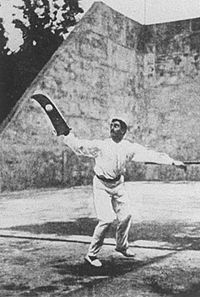
The 1900 Summer Olympics, today officially known as the Games of the II Olympiad and also known as Paris 1900, were an international multi-sport event that took place in Paris, France, from 14 May to 28 October 1900. No opening or closing ceremonies were held. They were the first Summer Olympics ever held in a non-leap year until the 2020 Summer Olympics, which were delayed to 2021 due to the COVID-19 Pandemic.

At the 1900 Summer Olympics, three croquet events were contested. Seven men and three women participated. The doubles competition was scheduled first, though it is unclear whether the French pair that won had any competition. The one-ball singles was played the next week, followed by two-ball singles the week after. France, which supplied all 10 competitors, therefore won all the medals.

Basque pelota is the name for a variety of court sports played with a ball using one's hand, a racket, a wooden bat or a basket, against a wall or, more traditionally, with two teams face to face separated by a line on the ground or a net. The roots of this class of games can be traced to the Greek and other ancient cultures.

The 1936 Summer Olympics, officially known as the Games of the XI Olympiad, was an international multi-sport event held in Berlin, Germany, from 1 August to 16 August.

Jeu de paume was an event contested at the 1908 Summer Olympics, the only time the Summer Olympic Games featured the sport as a medal event.

Athletics has been contested at every Summer Olympics since the birth of the modern Olympic movement at the 1896 Summer Olympics. The athletics program traces its earliest roots to events used in the ancient Greek Olympics. The modern program includes track and field events, road running events, and race walking events. Cross country running was also on the program in earlier editions but it was dropped after the 1924 Summer Olympics.

Cycling has been contested at every Summer Olympic Games since the birth of the modern Olympic movement at the 1896 Summer Olympics, at which a road race and five track events were held. Mountain bike racing entered the Olympic programme at the Atlanta Olympics, followed by BMX racing in 2008 and freestyle BMX in 2021. Before the 2020 Summer Olympics, all events were speed races, but the 2020 programme featured BMX freestyle for the first time.

Wrestling at the Olympic Games first appeared at the first modern Olympics, in the form of Greco-Roman wrestling, held in Athens in 1896. Wrestling would appear at every Summer Olympics held since then, with the exception of the 1900 Summer Olympics when wrestling did not appear on the program. Freestyle wrestling and weight classes both made their first appearance at the 1904 Summer Olympics. Women's freestyle wrestling competition was first held at the 2004 Summer Olympics.

The modern Olympic Games were founded by French historian Pierre de Coubertin. France has competed in every edition, with the possible exception of the 1904 Games.

Equestrian sports were first included in the Olympic Games in the Summer Olympics of 1900 in Paris. They were again included in 1912, and have been included in every subsequent edition of the Games. The Olympic equestrian disciplines are dressage, eventing, and show-jumping. In each discipline, both individual and team medals are awarded. Women and men compete on equal terms.

Tug of war was contested as a team event in the Summer Olympics at the Games of every Olympiad from 1900 to 1920. Originally the competition was entered by groups called clubs. A country could enter more than one club in the competition, making it possible for one country to earn multiple medals. This happened in 1904, when the United States won all three medals, and in 1908 when the podium was occupied by three British teams. Sweden was also among the top countries with two medals, one as a member of the mixed team.

Spain first participated at the Olympic Games in 1900, and has sent athletes to compete in most Summer Olympic Games since 1920. Spain has also participated in every Winter Olympic Games since 1936. Its team is organised by the Spanish Olympic Committee created in 1924.

Peru has officially participated in 19 Summer Olympic Games and 3 Winter Olympic Games. They did not send any athletes to the 1952 Summer Olympics. The Peruvian Olympic Committee is the National Olympic Committee for Peru which was founded in 1924 and recognized by the International Olympic Committee in 1936.

Argentina participated at the Olympic Games for the first time in 1900. It has participated at all subsequent Summer Olympics except in 1904, 1912, and the nation boycotted the Moscow Olympics due to its support for the United States in 1980. It participated at the Winter Olympics in 1928, 1948, 1952 and continuously since 1960.

Cuba first participated at the Olympic Games in 1900, and has sent athletes to compete in 20 of 28 Summer Olympic Games overall.

Basque pelota was featured at the Summer Olympics at the 1900 Games. It was contested in another three Olympiads as a demonstration sport: 1924, 1968 and 1992.
José de Amézola y Aspizua was a Spanish Basque pelotari who competed at the 1900 Summer Olympics in Paris, France.
Francisco Villota y Baquiola was a Spanish pelotari who competed at the 1900 Summer Olympics in Paris, France.
Maurice Durquetty was a French pelotari who competed at the 1900 Summer Olympics in Paris, France.
Etchegaray was a French Basque pelotari who competed at the 1900 Summer Olympics in Paris, France.
















